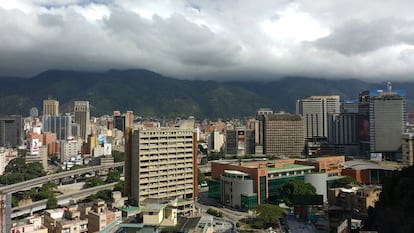Dangerous cities list: Latin America confirmed as world murder capital
Venezuelan capital of Caracas heads the ranking with 130.35 homicides for every 100,000 inhabitants

Forty-three out of the world’s 50 most violent cities are in Latin America and the Caribbean, according to an annual report by Mexico’s Citizen Council for Public Safety and Criminal Justice (CCSPJP). The list does not count cities currently considered to be in combat zones.
The Igarapé Institute in Brazil has confirmed this situation, noting that 14 out of the 20 countries with the highest homicide rates are in the same part of the world.
Latin America and the Caribbean are home to eight percent of the global population, yet account for 33% of homicides.
Latin American cities have the highest levels of inequality on the planet
Robert Muggah, Igarapé Institute
Venezuela has the dubious honor of being the only country with four cities in the top 10, with the capital, Caracas, leading the world ranking at 130.35 homicides for every 100,000 inhabitants.
The Mexican city of Acapulco comes in second with 113.24 homicides per 100,000 residents, followed by San Pedro Sula in Honduras, with a rate of 112.09 per 100,000.
The CCSPJP report only focused on cities with 300,000 residents or more, and did not factor in deaths in combat zones or in locations with no reliable data collection. This means that a lot of cities were left out of the list.
The government of strife-torn Venezuela, for instance, has not released accurate statistics on 2017 homicides. In order to reach a reliable figure for Caracas, an estimate was made based on activity at the Bello Monte morgue, which receives all kinds of victims – those who died in gang warfare and from gunshots, but also from car accidents. This information is of vital importance because the city’s funeral parlors do not organize wakes for victims of violence (mostly from firearms) that might involve gang warfare.
Robert Muggah, research director at the Igarapé Institute, says that Latin American cities have the highest levels of inequality on the planet, which might be one of the main reasons for their high ranking.
Venezuela has the dubious honor of being the only country with four cities in the top 10
While national elites grow – not just business leaders but also high-ranking politicians and members of government) – a large section of the population still lacks access to basic services such as drinking water (15% in Dominican Republic), electricity (18.1% in Nicaragua) or a sewer system (39% in Bolivia).
Muggah says that fast urban growth also has an impact on security.
In an article titled “Why is there so much crime in Latin America?” published in Insight Crime, author Nathalie Alvarado lists five factors that favor the rise of uncontrolled violence: an increase in local drug markets, a surge in organized crime, drug traffic exchanges between nations, and corruption at government level.
The list
The 10 most dangerous cities in the world, according to the CCSPJP, are the following (figures represent murders per 100,000 residents):
1. Caracas, Venezuela (130.35)
2. Acapulco, Mexico (113.24)
3. San Pedro Sula, Honduras (112.09)
4. Distrito Central, Honduras (85.09)
5. Ciudad Victoria, Mexico (84.67)
6. Maturín, Venezuela (84.21)
7. San Salvador, El Salvador (83.39)
8. Ciudad Guayana, Venezuela (82.84)
9. Valencia, Venezuela (72.02)
10. Natal, Brazil (69.56)
English version by Susana Urra.
Tu suscripción se está usando en otro dispositivo
¿Quieres añadir otro usuario a tu suscripción?
Si continúas leyendo en este dispositivo, no se podrá leer en el otro.
FlechaTu suscripción se está usando en otro dispositivo y solo puedes acceder a EL PAÍS desde un dispositivo a la vez.
Si quieres compartir tu cuenta, cambia tu suscripción a la modalidad Premium, así podrás añadir otro usuario. Cada uno accederá con su propia cuenta de email, lo que os permitirá personalizar vuestra experiencia en EL PAÍS.
¿Tienes una suscripción de empresa? Accede aquí para contratar más cuentas.
En el caso de no saber quién está usando tu cuenta, te recomendamos cambiar tu contraseña aquí.
Si decides continuar compartiendo tu cuenta, este mensaje se mostrará en tu dispositivo y en el de la otra persona que está usando tu cuenta de forma indefinida, afectando a tu experiencia de lectura. Puedes consultar aquí los términos y condiciones de la suscripción digital.








































